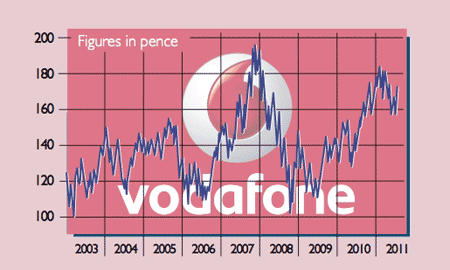
What is Vodafone?
One of the world’s largest mobile telecommunications firms, with revenues of £46bn and more than 370 million customers. Vodafone (VOD) provides mobile voice, messaging and data (internet and email) services. It also has a fixed-line telecoms business. Europe accounts for 49% of profits; another 40% comes from its 45% stake in US telecoms group Verizon Wireless. Vodafone is pinning its hopes for future growth on India, southern Africa and the Middle East.
What is the company’s history?
Founded in 1982 when Racal Telecom acquired a British cellphone licence, Vodafone grew rapidly during the 1990s as demand for mobiles boomed. The acquisitions of Airtouch and Mannesmann turned it into a telecoms giant. It survived the 1990s tech bubble in better shape than most, but still could not deliver acceptable returns on many of its investments. As industry growth slows, Vodafone has focused on delivering value, emphasising cash generation, share buy-backs and dividends.
Who runs Vodafone?
Vittorio Colao, former chief executive (CEO) of the European division, has been group CEO since July 2008. He was paid £2.7m in 2010. Michel Combes is now Europe CEO and Andy Halford is the finance director.
How is trading?
Quite tough. Service revenue for the quarter to June rose by just 1.5% as growth in emerging markets was offset by weak trading in southern Europe and the continued fall in mobile termination rates (fees charged to other networks to end calls to their own customers). Organic data revenue rose by 24.5%, messaging revenue by 5.3%, and fixed line by 6.4%, but voice revenues fell by 4.2%. On a brighter note, proceeds from the sale of its stake in French peer SFR saw net debt fall from £29.9bn to £23.1bn.
What’s the outlook for Vodafone?
Vodafone hopes growth in mobile data services and emerging markets, plus efficiency gains, will offset falling voice revenues. This should result in annual free cash flow of £5.5bn-£6.5bn, allowing dividend growth of at least 7% until 2013. Shareholders will also get a special 4p a share payout now Verizon Wireless has resumed dividend payments. If Verizon were regularly to pay Vodafone £2.8bn, and Vodafone paid £2bn to shareholders, free cash flow would grow by over 40% and dividends could grow well beyond the 2013 target of 10.18p.
The analysts
Of the 34 analysts surveyed by Bloomberg, 26 say “buy”, five say ”hold” and three say “sell”. The average price target is 195p – 15% above the current share price. Most bullish is Sanford Bernstein, with a target of 240p, whereas Société Générale is most bearish with a 100p target. Our view: with high levels of free cash flow, a 5.8% prospective dividend yield and 7% dividend growth to 2013, Vodafone looks good value. Further payouts from Verizon Wireless (see above and note these aren’t guaranteed) would add to its attractions.
The numbers
Stockmarket code: VODShare price: 159p
Market cap: £81bn
Net assets (Mar 2011): £87.6bn
Net debt (June 2011): £23.1bn
P/e (current year estimate): 9.8
Yield (prospective): 5.8%
Geographic ownership: UK 43%, US 28%
Directors’ dealings
Vodafone has reasonable corporate governance guidelines on share ownership. The CEO must own four times base pay, while other executive directors must own three times base pay. Over the last year, there has been some significant two-way trades by main board directors, prompted by the vesting of long-term performance awards. Details of the major deals are shown below and also on the above chart.
Director: Shares bought / Sold
John Bond: 110,000
Vittorio Colao: 2,181,000 / 1,134,000
Michel Combes: 217,609
Andrew Halford: 1,485,000 / 1,302,214
Stephen Pusey: 441,550 / 288,359
Nicholas Read: 868,517 / 542,585